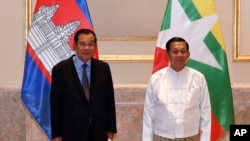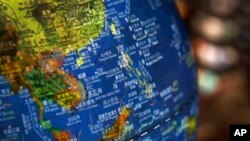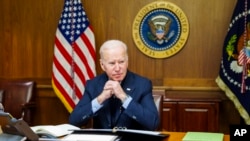Cambodia is tamping down expectations around its one-year turn as ASEAN chair ahead of a foreign ministers meeting that will test Phnom Penh’s ability to balance its allegiance to the regional alliance with its ever-tighter friendship with China.
Prime Minister Hun Sen quickly backed off his efforts to engage the Myanmar junta, with Cambodia’s foreign ministry rescinding its invitation for the military regime’s foreign minister, Wunna Maung Lwin, to join this week’s meeting in Phnom Penh.
Myanmar’s junta announced Monday that it would not send a non-political representative to the summit.
With low expectations about ASEAN’s ability to right the ship in Myanmar, the central challenge for Hun Sen and his diplomats is to maintain regional unity without alienating Beijing — a feat Phnom Penh failed to achieve during its last chairmanship a decade ago.
Astrid Noren-Nilsson, senior lecturer at the Centre for East and South-East Asian Studies at Lund University in Sweden and scholar of Cambodian politics, said Cambodia’s recent actions signal the government’s recognition that key member states, such as Singapore, Indonesia, and Malaysia, “will simply not accept Cambodia playing the maverick.”
“In fact, Hun Sen’s earlier strategy of direct engagement with the Myanmar junta was probably in large part motivated by him seeking to build a positive international image and legacy during his last chairmanship of ASEAN,’’ she said in an email to VOA Khmer. ‘’It appears he will not want to see that legacy tarnished by the strong resistance his approach met from those key member states.”
In its statement declining to send any representative to the Foreign Ministers Retreat, Myanmar’s Ministry of Foreign Affairs thanked Cambodia for working to “promote cooperation in ASEAN,” blaming “some members” for refusing to agree to the junta’s inclusion.
February 1 marked one year since the military, led by General Min Aung Hlaing, toppled the elected government of Aung San Suu Kyi. Observers say more than 1,500 people have since been killed in clashes and suppression of protests.
Cambodia said that with Myanmar showing “little progress” in the implementation of the Five-Point Consensus agreed in an April meeting — which called for ceasing hostilities and opening dialogue toward peace — it was difficult to create a consensus around inviting Myanmar’s foreign minister to join the meeting.
Following the setback, Hun Sen, who visited Naypyitaw on Jan. 7, hit back at critics of his ASEAN chairmanship, and suggested he was backing off his gambit to take a leading role in Myanmar’s reconciliation.
“I am waiting to see between the soft and hard approach. I have only about 11 months left… How can I solve the issue of Myanmar in one year as an ASEAN chair?” Hun Sen said last week in a public speech. “So the next one can solve it.”
Indonesia is set to become chair next year. Those remarks from Hun Sen marked a sharp turn from his earlier expressed desire to restore the 10-member bloc. But Noren-Nilsson said nobody expected Cambodia to solve the Myanmar crisis.
“Succeeding the chairmanship, from the perspective of other ASEAN member states, has become a matter of Cambodia demonstrating loyalty to ASEAN as a bloc,” she said.
“China will likely put substantial pressure on Cambodia to further its agenda throughout the 2022 Chairmanship, both on the South China Sea and the Myanmar crisis,” she said. “Cambodia’s top priority will remain not to antagonize Beijing, which may again force it to gravitate away from ASEAN unity.”
This year is the third time, Hun Sen, in power for 37 years, has taken the revolving ASEAN chair since joining the regional grouping in 1999. In 2012, Cambodia as chair was accused of blocking a joint statement related to the South China Sea, as member states Philippines, Vietnam, Malaysia and Brunei faced China over parts of the resource-rich waters.
Phay Siphan, Cambodia’s government spokesman, said the country will not be pressured, and ASEAN will adhere to the consensus principle. “No one is biased to anyone, since the decision is based on consensus,” he said.
The Chinese Embassy in Phnom Penh has not responded to VOA Khmer's request for comment.
Cambodia could attempt this year to reinvigorate efforts for the bloc to agree on a code of conduct for its engagement with China over the South China Sea. However, Bradley Jensen Murg, a fellow and senior advisor at the Cambodian Institute for Cooperation and Peace, said that was unlikely.
“I’m not seeing any variable change that would make me think it's going to happen. I think that it’s going to trundle along,” he said during a virtual launch-discussion event for a new Asia Foundation book on Cambodia’s chairmanship.
“Cambodia need not cede its chairmanship to COVID-19,” Murg said, “but rather, through effective leadership and a clear policy agenda, can work to lead ASEAN out of the pandemic while effectuating reforms and safeguards necessary for Southeast Asia’s long-term, sustainable development.”
Ear Sophal, a scholar of Cambodia’s politics and development at Arizona State University's Thunderbird School of Global Management, told VOA Khmer that as the chair of ASEAN, “Cambodia should listen, not dictate.”
“In 2012, Cambodia used its chairmanship to spoil ASEAN by blocking consensus,’’ Ear Sophal said in an email. ‘’This year, Cambodia acted like an autocrat, which again caused chaos. Cambodia should not practice cowboy diplomacy.”
“I believe the other members of ASEAN have already succeeded in reigning in Cambodia, because the authorities just announced that the general who is the Foreign Minister of Myanmar will not be invited,” he said.
The U.S. appears to give Cambodia the benefit of the doubt, with President Joe Biden writing in a Jan. 14 letter to Hun Sen that his administration looks forward to working with Cambodia.
"Under Cambodia's chairmanship, the United States hopes to both grow our relationship with ASEAN and continue to pursue our common goals in the region,” reads the letter. The U.S. “remains steadfast in its support for an ASEAN-centered regional architecture at the heart of the Indo-Pacific.”
Biden said he would also invite ASEAN leaders to join him in Washington for a special summit in the coming months.
In a statement ahead of this week’s foreign ministers meeting, Cambodia’s Foreign Affairs Ministry said attendees would “exchange views on how to further strengthen external relations with dialogue partners, while maintaining and promoting ASEAN centrality, solidarity and unite, and discuss ways and means to collectively endeavor to build a more resilient, dynamic, peaceful and prosperous ASEAN Community.”
Kin Phea, the director-general of the Royal Academy of Cambodia's International Relations Institute, said some member states “still have a negative idea” about Cambodia, and remain wary about its loyalty to China.
“Cambodia must show a neutral stance on all issues,” Kin Phea said.
Pich Charadine, deputy director of Cambodian Institute for Cooperation and Peace, said navigating a neutral course over the next year would require a cautious approach.
"As the chair, if you are not careful enough, there are many holes that we have to jump,” she said. “If not, we’ll fall into that.”
(Additional reporting in Washington DC by Men Kimseng)







